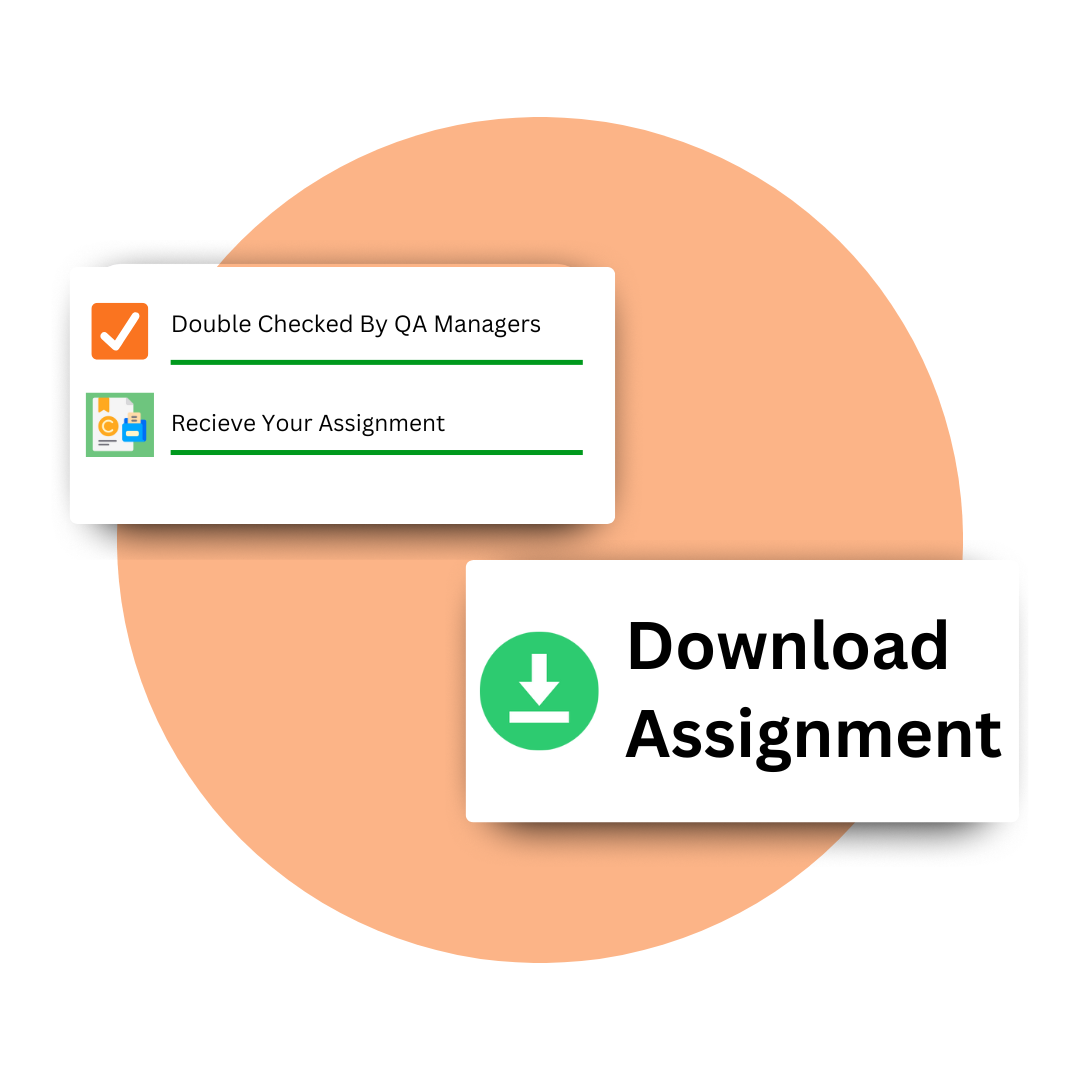Follow these simple steps to get economics assignment writing help from us

Tell us everything, including the topic, deadline, and pages, or submit your previous assignment for editing and proofreading

We will start to process it on our end by assigning one of the best writers in that particular field. And provide you with a reasonable price that you will need to pay.

Your assignment will be accomplished in the manner you want by our expert writer. And you get the polished version on time for review.
Our team is made up of highly experienced higher academics with a solid grasp of CIPD theory combined with real-world know-how. For better assignments, choose this method.
From high school to PhD, we offer customised support that meets your specific academic needs. Our adaptable services ensure your work aligns perfectly with your course requirements.
Every assignment passes through research, writing, and proofreading, and then only a comprehensive plagiarism check. This multi-levelled procedure guarantees the high calibre of the product.
Our customer care is always available for you to provide updates. Clear communication transfers the control of information to you for immediate attention.
UAE students can now get affordable 3MER assignment answers in UAE. You will face some challenges while navigating the 3MER unit, such as trying to understand complicated topics, managing group work, and keeping up with deadlines, but guess what? There are also excellent opportunities waiting for you! We’re here to help you navigate through these challenges.
We offer friendly support with assignments, ensuring that you understand the concepts without being overwhelmed. You will learn to communicate, work as a team, and be able to solve problems—more fundamental skills for the future. With our support, we can build your self-esteem and grades and open doors to future careers. So, do not be afraid to take advantage of the guidance presented to you together; we’ll turn challenges into stepping stones leading to success!
Employment relations are not only what happens inside work but also what takes place outside of work, mainly by influences from external factors. Some are important:
Political Factors: Government policies and labour laws. For instance, changes in minimum wage laws or employee rights might have a huge impact on how the business conducts its affairs.
Economic Factors Economic factors like recession or inflation impact the concept of job security and hiring strategies. When the economy is good, there is a tendency to employ more people. Conversely, when the economy is hard, firings take place.
Social Factors Changes in social attitudes impact the nature of workplace culture. For example, greater emphasis on diversity and inclusivity will lead organisations to adopt more inclusive practices.
Technological Advances: Introductions of new technologies can influence your work. That is, online working tools, for instance, have become a necessity; therefore, employers and employees should embrace and follow up on the new ways of communicating.
Legal Factors: One should ensure full compliance with employment regulations such as health and safety laws. Businesses have to make sure to follow these laws in order not to get entangled with law enforcement.
Knowledge of the above factors will ensure you get a clear idea of how factors outside shape employment relations in your organisation.
Understanding the different types of employment status is crucial for both employers and employees, as it affects rights, responsibilities, and entitlements. The main types of employment status include:
Employee: Employees work under a contract of employment, which outlines their rights and obligations. They are entitled to benefits such as paid leave, sick pay, and redundancy pay. Employees typically have a higher level of job security and are protected by various employment laws.
Worker: Workers have a more flexible relationship with the organization than employees. They may work under a contract but do not have the same rights as employees. Workers are entitled to certain protections, such as minimum wage and holiday pay, but may not receive benefits like sick pay or redundancy pay.
Self-Employed: Self-employed individuals run their own businesses and are not considered employees or workers of any organization. They are responsible for their own tax, National Insurance contributions, and business expenses. Self-employed individuals have more flexibility in terms of how they work but lack the protections and benefits afforded to employees and workers.
Freelancers: Freelancers are a subset of self-employed individuals who typically work on a project basis for multiple clients. They often have more control over their work schedule and the projects they take on, but they also bear the risks associated with inconsistent income and lack of job security.
Casual Workers: Casual workers are employed on an irregular basis and typically do not have a fixed schedule. They may be called in as needed, and often have less job security and fewer benefits.
Understanding these different types of employment status is essential for determining the rights and obligations of both employers and employees, as well as for ensuring compliance with employment laws.
Determining an individual’s employment status is crucial for several reasons:
Legal Compliance: Different employment statuses come with varying legal rights and responsibilities. Misclassifying an employee can lead to legal repercussions, including fines and penalties. Employers must ensure that they comply with employment laws and regulations, which can vary based on the individual’s status.
Rights and Benefits: Employment status directly affects an individual’s entitlements to benefits such as sick pay, holiday pay, pensions, and redundancy pay. Accurately determining status ensures that individuals receive the appropriate benefits and protections they are entitled to, fostering a fair workplace.
Tax Implications: Employment status influences tax obligations for both the employer and the individual. Employees have taxes withheld from their paychecks, while self-employed individuals must handle their own tax payments. Misclassification can lead to tax liabilities and potential audits from tax authorities.
Workplace Relations: Understanding employment status helps in managing workplace relationships. Employees may have different expectations and levels of commitment compared to self-employed individuals or freelancers. Clear communication regarding roles and responsibilities can help prevent misunderstandings and conflicts.
Organizational Planning: Knowing the employment status of individuals within an organization aids in workforce planning and management. It allows employers to allocate resources effectively, manage costs, and plan for future hiring needs based on the nature of the employment relationships.
Employee Engagement and Retention: When individuals understand their employment status and the associated rights and benefits, they are more likely to feel valued and engaged within the organization. This can lead to higher employee morale, increased retention rates, and a more positive workplace culture.
Achieving a healthy work-life balance is essential for employees, as it can lead to increased job satisfaction, reduced stress, and improved mental health.
Importance of Work-Life Balance:
Influence of Legislation: Legislation can significantly influence work-life balance by establishing minimum standards for working hours, leave entitlements, and flexible working arrangements.
For example:
Legal support for employees as family members generally revolves around family leave policies and protections that allow them to care for family members without jeopardizing their employment. Key aspects include:
Fair treatment in relation to pay is crucial for several reasons:
Discrimination legislation aims to prevent unfair treatment based on specific protected characteristics. Key points include:
Good practice in organizational policies is essential for fostering a positive workplace culture and contributing to the psychological contract, which refers to the unwritten expectations and mutual obligations between employers and employees. Key elements include:
By implementing good practices in organizational policies, employers can strengthen the psychological contract, leading to enhanced employee engagement, loyalty, and overall organizational success.
Dismissal refers to the termination of an employee’s contract of employment. The distinction between fair and unfair dismissal is crucial in employment law, as it determines whether an employee has grounds to claim compensation or challenge the dismissal.
Fair Dismissal: Fair dismissal occurs when an employer terminates an employee’s contract for a valid reason, following a fair procedure. Common grounds for fair dismissal include:
Unfair Dismissal: Unfair dismissal occurs when an employee is terminated without a valid reason or when the employer fails to follow a fair procedure. Key points include:
In summary, the key difference lies in the justification and procedure followed by the employer. Fair dismissals are justified and follow proper procedures, while unfair dismissals lack valid reasons or fail to adhere to fair processes.
Exit interviews are conducted with employees who are leaving an organization, whether voluntarily or involuntarily. They serve several important purposes:
Overall, exit interviews are a valuable tool for organizations to gather feedback, improve retention, and enhance the overall work environment.
Managing redundancies is a sensitive and complex process that requires careful planning and adherence to legal requirements. The key stages include:
By following these key stages, organizations can manage redundancies in a fair and legally compliant manner, minimizing the impact on employees and maintaining a positive workplace culture.
The Benefits of Choosing Our 3MER Assignment Writers, According to Clients
H
Hamdan saif

Only 2 days were left to submit my 3000-word CIPD Level 3 assignment at Leeds Beckett University and I was panicked. But thanks to CIPD Assignmnet Helper who came to the rescue and delivered quality assignments within a day. I had enough time to revise it before submission.
F
Fathima Qureshi

As a student from LEORON Institute, I was afraid to choose an online service for my CIPD level 3 assignment but the result I got from the CIPD Assignment Helper was outstanding. The structure and the coverage of topics were very clear. My instructor had a positive feedback on the assignment. Will be back here soon! Thank you so much.
A
Abu Bakar

I needed a last-minute assignment for my CIPD Level 3 and thanks to the CIPD assignment helper. they delivered a perfectly written assignment that my professor in PwC’s Academy was impressed with and gave me top marks every time I get an assignment I come here and get top marks.
M
Muhammad Al Maqah

I’m a student doing my CIPD course from avodo in Fujairah. I was struggling with my CIPD Level 3 assignment but thanks to this website. I got my assignment within 3 days and the assignment quality was so good that I passed my course with very good grades.
M
Mariam

Thank you for your professional assignment; today i was appreciated by my professors for writing the best assignment and they praised me because of you and they don’t even know that
A
Abdul Hassan

I ordered my CIPD assignment here for the first time and got outstanding results. I got an A+ and saved a lot of time.
Hire Our 3MER Assignment Writers for custom-written assignment answers in UAE.
